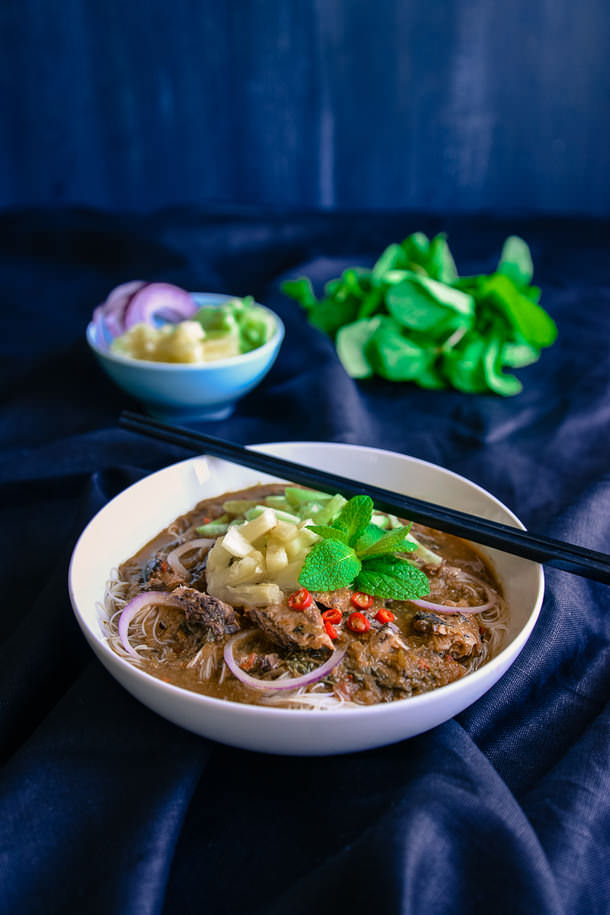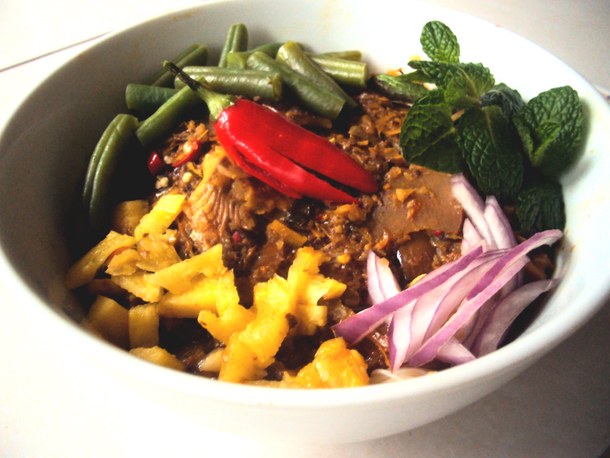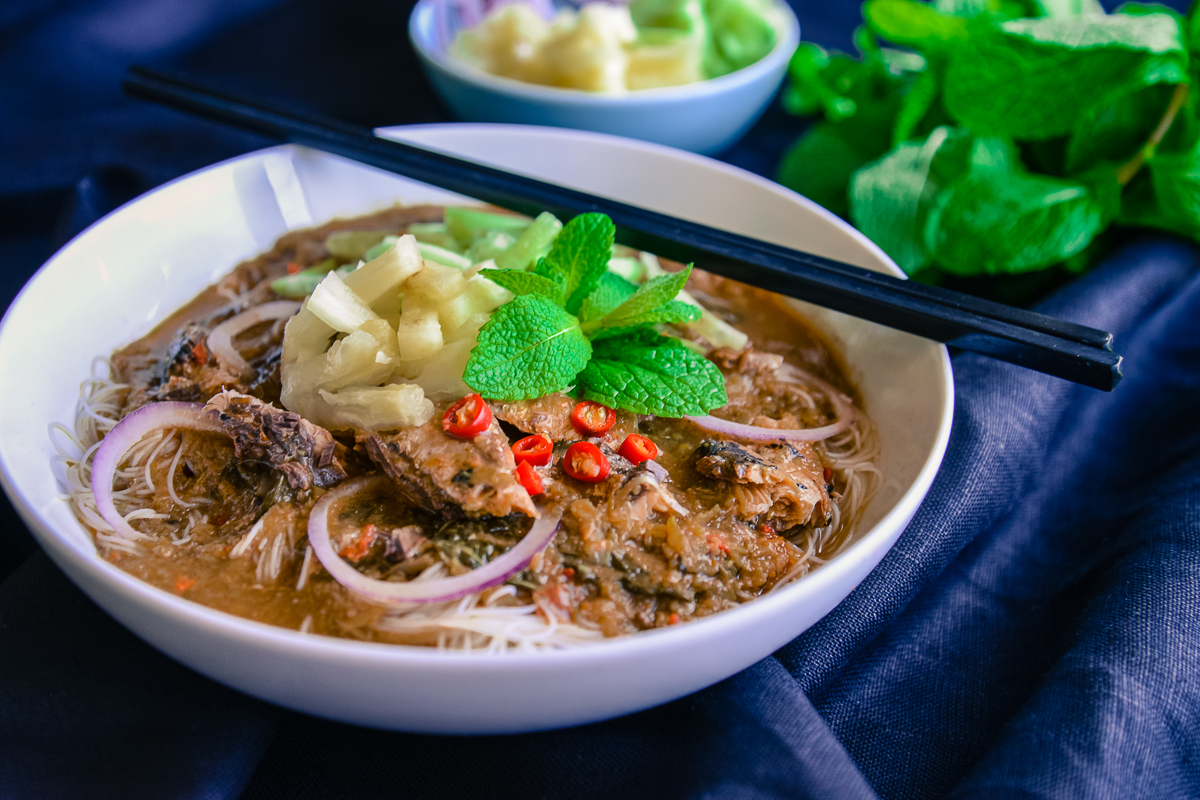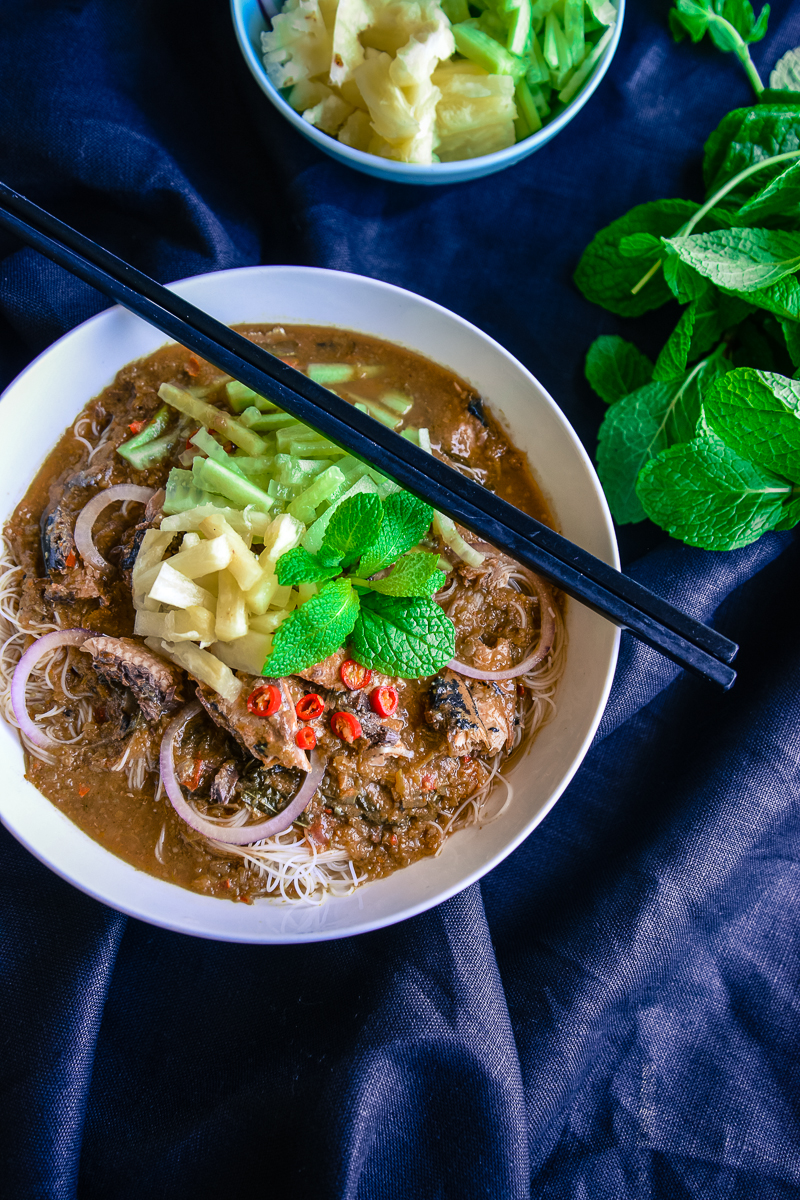
I don’t make a habit of re-visiting blogged recipes — it’d be a bit like re-visiting an ex boyfriend — but there are always exceptions to every rule. In this case, I’ve been itching to redo my Grandmother’s Penang Asam Laksa post for the longest time; while the words hold up fine the photography and styling don’t do my grandmother’s recipe justice.
Consider this photograph of the finished Assam Laksa in my old post.

Yikes. Apologies to anyone who stumbled upon my blog looking for an Assam Laksa recipe and found that. It looks completely unappetising. It doesn’t even look like Assam Laksa.
So I’ve been looking for an opportunity to tweak and re-blog this recipe and when Father’s Day rolled around today, I realised it was the perfect time. You see, my father absolutely loves this recipe as it’s adapted from his mother’s. Sadly, she passed away last year so cooking her food is a way of keeping her memory alive and making my dad happy.

Assam Laksa is the perfect present for my dad because he’s not really into (bought) presents. A home-cooked meal based on his mother’s recipe, however, is something that he can truly appreciate.
So Happy Father’s Day, dad. We love you very, very much. And Happy Father’s Day to all the fathers out there, too!

My Grandmother’s Asam Laksa 2 – re-worked and simplified
Assam Laksa is truly an exceptional dish – an intoxicating noodle soup dish with the perfect balance of spicy, sweet, sour, salty, and savoury flavours. This is not a dish for the meek and mild – this is an assertive and robust dish that will jolt your tastebuds and get your blood pumping. Enjoy!
INGREDIENTS FOR PASTE
- 10-12 Bird’s Eye chillies
- 4-5 sticks lemon grass – lower half, white part, cut into fine slices OR 5 tablespoons drained lemongrass from jar
- 1 small piece turmeric, peeled and diced
- 1 small piece galangal (lengkuas), peeled and diced
- 2 ginger flower stalks (bunga kantan)
- 2/3 block belecan, about 160 grams
- 3/4 cup diced shallots (can substitute with onions)
- 1/4 cup water
INGREDIENTS FOR SOUP
- 3 tablespoons vegetable oil
- 1.5 litres water
- 1 bunch laksa or vietnamese mint leaves (daun kesom), washed
- 1/3 cup dried tamarind (asam), soaked in hot water for 30 minutes and then drained
- 4-5 tablespoons tamarind (asam) juice
- 4 teaspoons sugar
- 3 tablespoons light soy sauce
- 2 large cans sardines in tomato sauce
- 1 large pack rice vermicelli, cooked according to instructions
INGREDIENTS FOR GARNISH
- 1/2 fresh pineapple, peeled, cored, de-eyed, and cut into shreds
- 1 large cucumber, peeled and cut into matchsticks
- Bunch fresh mint, washed
- 1 red onion or 2 shallots, peeled and sliced very finely
- Few teaspoons of Hae ko, a thick, sweet Shrimp paste, to garnish (optional)
METHOD
- Blend all ingredients for paste until finely ground and mud like.
- To make soup, heat up a large non stick pot and add cooking oil.
- Add paste and cook over a medium heat, stirring frequently, for around eight minutes so paste ‘splits’ and separates from the oil.
- Add 1.5 litres water, laksa leaves, dried tamarind, tamarind juice, sugar and soy sauce and bring to the boil.
- Taste and adjust seasoning if you like, adding more tamarind juice for a more sour taste, more sugar for a sweeter taste and/or more light soy sauce for a saltier taste.
- Add sardines in tomato sauce, break the fish up gently with a ladle and simmer for a further 15-20 minutes.
- To serve, use chopsticks to put rice noodles in a bowl and spoon over steaming hot soup and fish.
- Garnish with pineapple, cucumber, mint and shallots.
- Add a spoonful of hae ko if you like for a stronger shrimp flavour.
A note on ingredients: my old post has (bad) photos of most of the ingredients for reference. I found all of them at my Asian grocer but the ginger flower is not always available.







